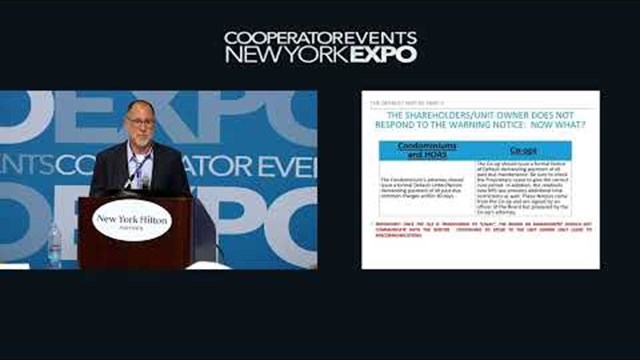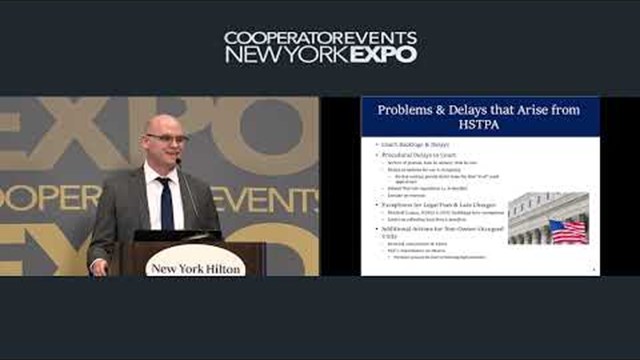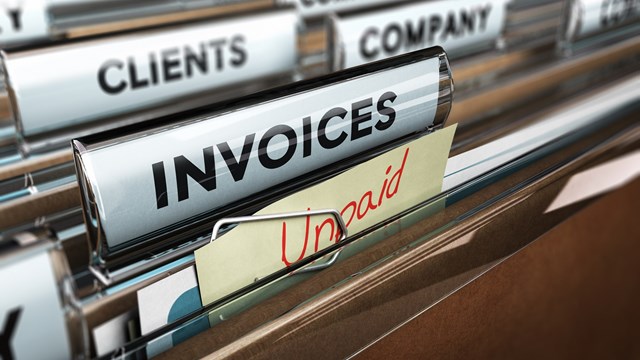
A common problem facing condo associations, boards and managers is how to compel unit owners who fall behind in their common charges to pay their arrears. In a condominium association with only a few units, if even one unit owner falls behind in common charge payments, the building may have trouble meeting operating expenses. When unit owners in larger condominium associations with many units fall into arrears, although the impact may not be felt immediately, eventually the shortfall will have to borne by the other unit owners via increases in common charges or assessments.
The good news is that there are several effective legal methods a condo association's attorney can use to collect common charge arrears on behalf of a building once non-judicial methods of collection have been exhausted. Which method or combination of methods will be best for a particular situation will depend on the circumstances.
When a person purchases a condo unit, he or she becomes contractually bound to abide by the condominium's declaration and by-laws, which set forth when common charges are due. As a result, if a unit owner falls into arrears on his or her common charges, the board of managers (on behalf of the unit owners of the condominium association) may sue the delinquent unit owner for breach of contract to obtain a money judgment. Additionally, the New York State legislature has enacted several laws, which, among other things give condominium boards the ability to bring foreclosure actions and take back a unit from a unit owner in arrears, similar to a mortgage bank's ability to foreclose a mortgage.
A simple way to attempt collection of common charge arrears is by suing the delinquent unit owner for breach of contract due to his or her failure to pay common charges pursuant to the by-laws of his or her condominium. Assuming the unit owner has no valid defense or fails to raise a defense to his or her lack of payment, the board of managers will be awarded a money judgment, which will be docketed against the unit owner in the county clerk's office.
Next, the board can attempt to enforce the judgment by having a marshal or sheriff levy on the judgment. When a marshal or sheriff levies on a judgment they can confiscate the debtor's personal property, sell the property at auction, and then use the proceeds of the sale to pay off the judgment debt. The marshal or sheriff can also freeze the money in a judgment debtor's bank accounts. Lastly, the judgment debtor's employer can be contacted in order to garnish his or her wages.
With such a variety of resources a creditor with a money judgment is able to levy upon, commencing an action for breach of contract can be an effective means to collect common charges. However, to a large extent, the utility of obtaining a money judgment will depend on whether the debtor is employed and whether his or her personal property and other assets can be located.
In addition to commencing a lawsuit to obtain a money judgment, a board of managers can simultaneously pursue statutory remedies to collect common charge arrears, which are contained within New York State Real Property Law. Which statutory method or methods should be used depends on whether the unit is occupied by the unit owner, is leased, or is vacant, and whether the unit is encumbered by mortgages or other liens.
In the situation where a condominium unit owner leases his or her unit rather than occupying it and the unit owner fails to pay his or her common charges, Real Property Law Section 339-kk authorizes condo boards to collect rent payments directly from the unit owner's tenants. This is accomplished by simply sending a notice to the tenants, in accordance with the statute, advising them to start making monthly rental payments to the condominium rather than the unit owner. The condominium can continue collecting monthly rent directly from the tenants until the unit owner's common charge arrears are cured. An ancillary benefit of sending the 339-kk notice to the unit owner's tenants is that it may cause the unit owner some embarrassment, which by itself may spur the unit owner to pay his or her arrears.
Unfortunately, sometimes out of fear of some form of retaliation from the unit owner, or if the unit owner's tenants are similarly financially irresponsible or insolvent, the unit owner's tenants may disregard the board of managers' 339-kk notice. If this happens, based on relevant case law, it appears that the board of managers can sue the unit owner's tenants to compel them to make use and occupancy payments to the condominium while simultaneously pursuing legal remedies against the unit owner. In essence, Real Property Law Section 339-kk gives boards of managers an additional financial resource to tap for payment. Accordingly, authorizing the condominium's attorney to prepare and serve a 339-kk notice is a good first step towards collection of common charge arrears in the scenario where a unit owner leases his or her unit.
A board's ultimate weapon for collecting common charge arrears is filing a lien against the unit and foreclosing on it pursuant to Real Property Law Section 339-aa. Real Property Law Section 339-aa enables a board of managers to foreclose a common charge lien as if it were a mortgage and eventually take title to a unit if the owner can't pay - or refuses to pay - what is owed. Whether to pursue a lien foreclosure will depend on a variety of factors, including, but not limited to, the amount owed to the condominium, whether other liens were previously filed against the unit, and the fact that lien foreclosures can be costly and can take several years to complete. However, even if a board of managers opts not to pursue a lien foreclosure, it should still file a lien against the unit.
Filing a common charge lien against the unit in the recording office of the county where the condominium's declaration is filed serves as a quick and relatively inexpensive method of protecting the condo. Once the lien is filed, it serves as notice to the world of the unit owner's debt owed to the condominium. The unit owner will be unable to sell or refinance his or her unit without first paying off his or her arrears to the condominium. Additionally, in the event that any superior lienholder forecloses on the unit, the superior lienholder will be required to give the condominium's board of managers notice of its foreclosure. Ultimately, this will enable the condominium to share in any surplus monies if the superior lienholder sells the unit at foreclosure for an amount greater than the lien it foreclosed. (A discussion of lien priorities is beyond the scope of this article; however, generally, a lien recorded prior to another lien will be superior to the later recorded lien - with some exceptions for liens filed by government entities.)
Lastly, when the condominium's lien is filed, the condominium becomes a secured creditor under the Federal Bankruptcy Code. In the event the delinquent unit owner files for bankruptcy, the condominium will ultimately get a higher percentage of the debt paid as a secured creditor than if it didn't file a lien.
Assuming a condominium's board of managers files a lien for unpaid common charges and commences a foreclosure action against a delinquent unit owner under Real Property Law Section 339-aa, the statute also provides that the condo may apply to the court for a receiver to be appointed while the foreclosure is proceeding, if such remedy is provided for in the condominium's bylaws. (A provision authorizing the appointment of a receiver is standard in condominium bylaws.) A receiver is an individual appointed by the court to protect a property that is being foreclosed from damage or neglect caused by its owner, by authorizing the receiver to collect rent for the property and manage the property while the foreclosure action is proceeding. (It is a good idea to request that the building's property manager be appointed as the unit's receiver because he or she will be familiar with the property and will already have a bookkeeping system in place.)
Once the court approves the appointment of the receiver, the receiver can start collecting rent from the unit's owner if the unit owner resides in the unit, or from the unit owner's tenant if the unit owner rents the unit out. If the unit is vacant at the time the receiver is appointed, the receiver can renovate the apartment, if necessary, and then rent it out for the benefit of the condominium. Whether or not applying to the court to have a receiver appointed will be cost-effective will depend on a variety of factors such as whether the unit is currently owner occupied or leased, the condition of the unit and the climate of the apartment rental market.
It is critical for boards of managers to take a proactive role in collecting common charge arrears to ensure that their condominium associations remain financially stable. As soon as a unit owner misses a monthly common charge payment without explanation, the board of managers should instruct their property manager or attorney to send a letter to the unit owner advising them that their account is in arrears. If no repayment schedule can be established with the unit owner, the board of managers should confer with the condominium association's property manager and attorney in order to choose the best method or methods of collecting the arrears. Regardless of the method or methods of collection chosen, prompt action will save the condominium money in the long run.









31 Comments
Leave a Comment